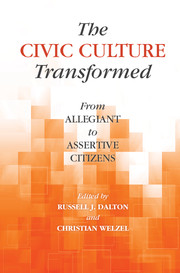Book contents
- Frontmatter
- Dedication
- Contents
- List of Figures
- List of Tables
- Contributors
- Foreword
- Preface and Acknowledgments
- 1 Political Culture and Value Change
- Part A Changing Values
- Part B Changing Images of Government
- Part C The Impact of Cultural Change
- 8 The Structure and Sources of Global Environmental Attitudes
- 9 Social Change and the Politics of Protest1
- 10 Mecca or Oil?
- 11 Allegiance Eroding
- 12 From Allegiant to Assertive Citizens
- References
- Index
10 - Mecca or Oil?
Why Arab States Lag in Gender Equality
Published online by Cambridge University Press: 05 January 2015
- Frontmatter
- Dedication
- Contents
- List of Figures
- List of Tables
- Contributors
- Foreword
- Preface and Acknowledgments
- 1 Political Culture and Value Change
- Part A Changing Values
- Part B Changing Images of Government
- Part C The Impact of Cultural Change
- 8 The Structure and Sources of Global Environmental Attitudes
- 9 Social Change and the Politics of Protest1
- 10 Mecca or Oil?
- 11 Allegiance Eroding
- 12 From Allegiant to Assertive Citizens
- References
- Index
Summary
Achieving gender equality is a challenge for all states – but particularly for those in the Middle East and North Africa (MENA). The Arab Human Development Report (UNDP 2006) highlights the multiple ways that gender equality in the region continues to lag behind the rest of the world. One of the most difficult challenges concerns elected office; women members are roughly one in six of Arab parliamentarians (17.8 percent), below the world average (21.8 percent) (Interparliamentary Union 2013). The lower houses of parliament in Yemen and Oman both include only one woman member, whereas none are appointed to the Qatar national assembly. These extreme disparities persist despite some significant breakthroughs in particular states, notably the implementation of reserved seats in the lower house of parliament in Morocco (21 percent women) and gender quotas in Algeria (31.6 percent women) and Iraq (25.2 percent women) (Norris 2007). Even ultraconservative Saudi Arabia has responded to global norms; in January 2013, King Abdullah of Saudi Arabia issued a historic decree allowing women to be members of the kingdom’s previously all-male parliament for the first time. The mandate creates a 20 percent quota for women in the 150-member Shura Council, the formal advisory board of Saudi Arabia, and the king immediately appointed thirty women to the assembly (20 percent).
Yet, at the same time, some Arab countries have also gone backward. In Egypt, sixty-four women (12.6 percent of the Assembly’s elected membership) were elected in 2010, the highest proportion in the nation’s history. Victory proved short-lived, however. Less than two months after the elections concluded, the ouster of President Mubarak prompted the dissolution of parliament by the Supreme Council of the Armed Forces (SCAF) and the abolition of reserved seats for women.
- Type
- Chapter
- Information
- The Civic Culture TransformedFrom Allegiant to Assertive Citizens, pp. 240 - 260Publisher: Cambridge University PressPrint publication year: 2014
- 4
- Cited by

